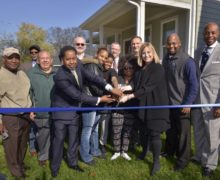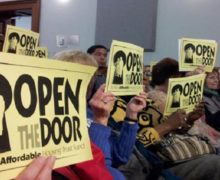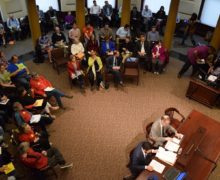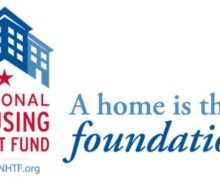State Enabling Legislation Helps Build Local Housing Capacity in Minnesota, Washington
by Katy Heins // Summer
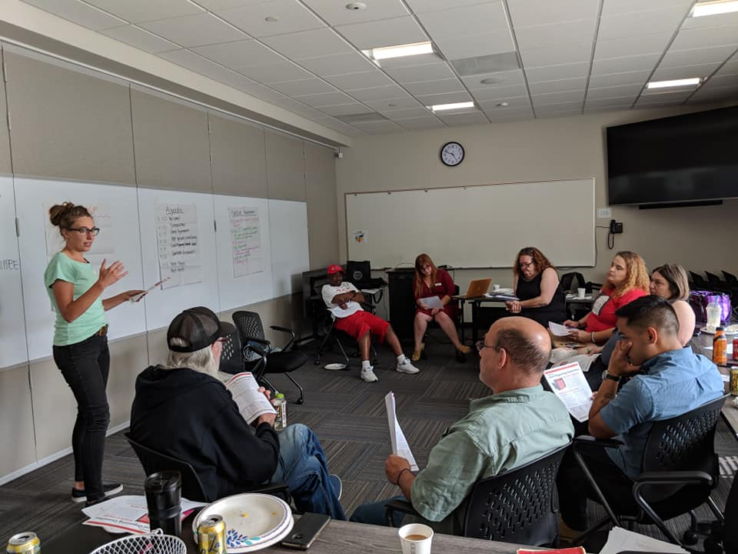
This summer, advocates in Minnesota and Washington started projects to implement policies that are now possible because of state enabling legislation. State enabling legislation can help build local housing capacity, however communities will need to make sure their local community is aware of the opportunity and enacts local policy needed in order to build their housing capacity.
State enabling legislation refers to a range of initiatives taken at the state level to make it possible, easier, or even encourage cities and/or counties to create their own housing trust funds. These range from states passing legislation enabling cities or counties to create housing trust funds to legislation that actually identifies a revenue option and provides matching funds. These initiatives have had a huge impact on the number and growth of local housing trust funds in the United States July, Minnesota Housing Partnership (MHP) announced the release of its Local Housing Trust Fund Manual for Minnesota. With 80 pages of references, case studies and explanations, the Local Housing Trust Fund Manual for Minnesota provides an in-depth discussion of key decisions local communities will make to establish a Local Housing Trust Fund (LHTF) — from creating priorities to choosing revenue sources.
In 2017, the State of Minnesota passed legislation that provided specific regulatory guidance. Minn. Stat. §462C.16, Subdivision 4 identifies some funding source categories for a “Housing Trust Fund for Local Housing Development” and clarifies that the listed sources are not exclusive, as the jurisdiction can finance its local or regional housing trust fund with “…any money available to the local government, unless expressly prohibited by state law”.
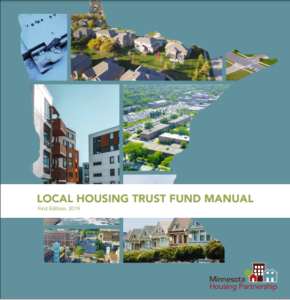 MHP created the Manual in order to encourage best practices for local communities in Minnesota to take advantage of their ability to create a local housing trust fund.
MHP created the Manual in order to encourage best practices for local communities in Minnesota to take advantage of their ability to create a local housing trust fund.
MHP’s Manual is a resource that communities of any size can use. It takes lessons learned by cities and counties in Minnesota and combines them with in-depth discussions of current best practices. Furthermore, MHP has followed up the Manual release with three webinars: Introduction to Local Housing Trust Funds, Guide to Implementation, with a third being planned on community engagement and advocacy. The goal of the webinars is to allow for more in-depth discussion and understanding for public officials, administrative staff and local advocates. The webinar can be viewed on the MHP website.
Washington Low-Income Housing Alliance worked hard this spring to get their state to pass HB 1406, the Affordable Housing Sales Tax Credit that allows local cities and counties to retain a portion of the state sales tax to use for affordable housing over the next 20 years. The bill creates a brand new funding source for affordable homes without increasing local taxes, It is an opportunity for local jurisdictions to bond against a 20-year revenue stream and build more homes immediately. If every county opts in, rough estimates show that over the 20-year period, HB 1406 will provide nearly $500 million would be available to support affordable housing projects throughout Washington. Should they choose to, local governments also have the option to pool their resources through inter-local agreements to achieve a regional impact. HB 1406 also creates incentives for cities and counties to take advantage of existing state enabling legislation provisions that allow local jurisdictions to enact special housing levies and sales taxes.
The law was written in such a way that in order to access funds a county or city must take two timely steps:
- First, it must pass a resolution of intent to use the funds by January 27, 2020.
- Second, after passing a resolution, it must pass a local ordinance to enact the funding by July 27, 2020.
If both the city and county take action to use the funds, the city and county split the money. In the instance that the county does not take action, and city within the county does act, the city potentially loses authority in year two to collect the county share; it is otherwise a twenty year source of funds. HB 1406 provides two important caveats:
- If both a city and county take action to use HB 1406, then the city and county will split the funds. However, cities that have already passed or that take action to pass a qualifying local housing levy or sales tax by July 27th, 2020 are able take the county’s portion of HB 1406 funds and,
- Cities that have already passed or that take action to pass a qualifying local housing levy or sales tax by July 27th, 2020 are able to use HB 1406 funds even if their county doesn’t act.
The Alliance is working to educate their members, public officials and housing advocates throughout the state on the opportunity to use this potential funding source to build affordable homes. They have led multi-pronged education campaign such as an informative webinars, research on funding for each county could receive and sample ordinance for advocacy efforts. The Alliance also took advocacy out in the field to combining their listening sessions with an ask for advocacy on HB 1406. At the writing of this article of the 37 counties in Washington, 16 counties have taken at least the first step toward securing funds for their community.
For more information on examples of State Enabling Legislation and how other states and communities have used this tool visit Community Change’s Housing Trust Fund Project Website.
For more information or to download the Local Housing Trust Fund Manual for Minnesota, visit MHP’s website. Or contact Elizabeth Glidden elizabeth.glidden@mhponline.org
For more on HB 1406 details click here for more information on the campaign click here. Or contact Michelle Thomas at michelet(at)wliha(.)org



